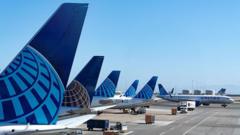The Trump administration has initiated an investigation into the importation of commercial aircraft, jet engines, and associated components, potentially paving the way for new tariffs, adding to existing trade measures already imposed by the administration.
A federal notice released indicates that Commerce Secretary Howard Lutnick commenced the inquiry on May 1. This move, executed under the Trade Expansion Act, allows for the implementation of tariffs on foreign goods believed to pose national security risks.
Historically, President Trump has utilized this authority to impose tariffs on steel and aluminum. The latest investigation seeks to gather industry perspectives regarding the demand for these aviation products and the capability of domestic producers to meet that demand, primarily looking into the significance of foreign suppliers within the sector, and the advantages afforded by foreign governments to these businesses.
Aerospace, a major contributor to U.S. trade surpluses for many years, may face risks from new tariffs, despite its significant exports, projected to reach $125 billion this fiscal year—the second-highest sector behind oil and gas. Eric Fanning, president of the Aerospace Industries Association, expressed concern, stating, "Our record of trade surpluses, job creation and innovative contributions to both air transport and national defense is the best news story for the American economy among all manufacturing sectors." He emphasized the importance of working with the Commerce Department to maintain the favorable trade conditions that have solidified U.S. global leadership in aerospace.
Boeing, a key player in the commercial airplane market, noted the immediate effects of previously imposed tariffs as minimal but raised concerns regarding their potential impacts on supply chains. Boeing CEO Kelly Ortberg reported that the company had experienced 10 percent tariffs on components sourced from Japan and Italy for wide-body jets, asserting that these costs are expected to be recuperated upon the sale of the aircraft.
In contrast, RTX, a manufacturer of engines and components, estimated a substantial tariff cost of about $850 million this year, while GE Aerospace projected a $500 million hit in tariff expenses.
The aviation sector has faced long-standing tensions between the U.S. and the European Union over perceived subsidies to major manufacturers Boeing and Airbus, with the latter being headquartered in France and operating widely across Europe. A resolution was reached in 2021, concluding a 17-year conflict over these subsidies and creating collaborative efforts against China's growing influence within the global market.
Niraj Chokshi reports on critical developments within aviation, rail, and other transport-related industries.




















